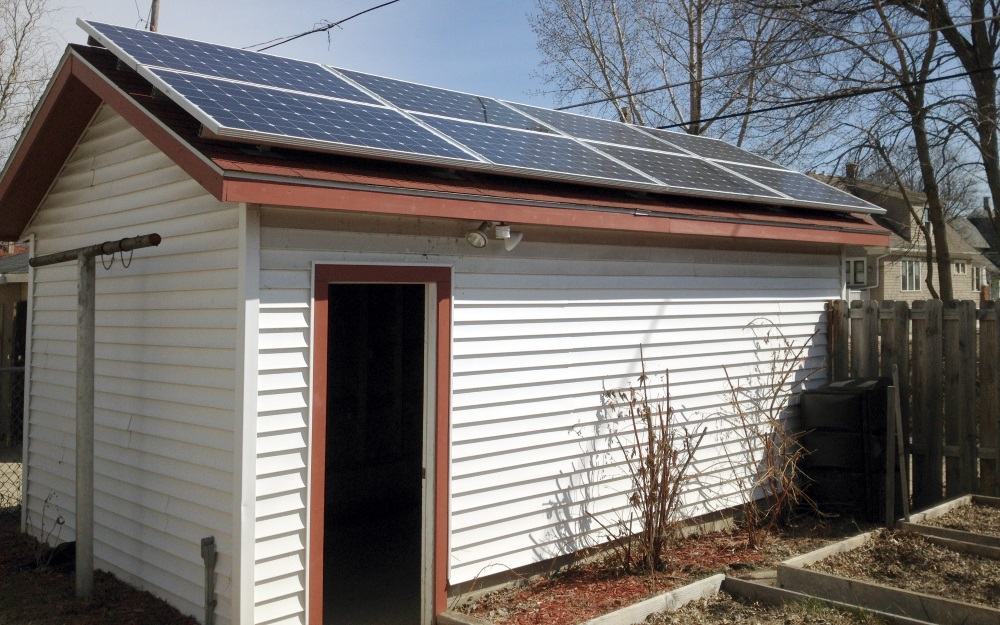We Energies Pushes Solar Charge. Again
Surcharge could cost solar users $180 year. Court rejected proposal in 2014.
Wisconsin utility We Energies is seeking to charge customers with solar $3.53 per kilowatt they generate, reviving a controversial 2014 effort that the utility describes as making sure customers with solar pay their “fair share” to keep up the grid. Solar advocates say the charge could increase bills for small businesses and residents by hundreds or thousands of dollars a year and make solar not financially viable for some.
The Wisconsin Public Service Commission approved the utility’s 2014 proposal to charge customers with solar an extra $3.79 per kilowatt of installed capacity, but a circuit court judge later rejected it amid massive outcry from residents and advocacy groups. At the time, the commission ruled that We Energies did not have sufficient data to support its request for the charge. Now the company claims to have data to show that the charge proposed in its recently filed rate case is warranted.
Clean energy advocates describe We Energies’ proposed charge on customers with solar as ironic given that in the past year the utility has announced its support for solar and instituted two solar projects of its own, including one known as “Rent a Roof” in which the utility pays customers to use their roofs for utility-owned solar arrays. Critics say We Energies continues to be hostile to the concept of distributed solar owned by others, as evidenced by the proposed charge and its ongoing battle with the city of Milwaukee and developer Eagle Point over their hopes to install third-party-owned solar on municipal buildings.
In Michigan, the Public Service Commission recently rejected DTE’s proposal to charge customers with solar an extra $12 to $15 a month. And in Iowa, the state Legislature ended its session without passing a bill that would have increased fees on people with solar, by more than $300 for an average household, according to one utility.
Tyler Huebner, executive director of RENEW Wisconsin, said the charge proposed in Wisconsin could mean about $180 a year for a typical residential customer and over $4,000 a year for small business customers with solar installations, assuming that a homeowner might generate about 4.5 kilowatts a month and a mid-size business about 100 kilowatts.
“Over time we’re talking about serious money,” he said. “It reduces the payback. It would extend out the number of years you need to recoup the value you’ve put into owning a solar system.”
We Energies spokesperson Brendan Conway said that “under our proposal, typical solar customers would pay $12 to $15 a month. Even after paying that fee they would still pay $50 less a month than a typical customer without solar. If a customer is choosing solar solely on cost savings, there is still a significant savings.”
The charge proposed in 2014 was based on an array’s nameplate capacity, while the currently proposed charge is based on the amount of energy actually generated. Data submitted to the commission by We Energies shows that many customers with solar actually generate more than their nameplate capacity.
Conway said the charge is necessary to make sure that customers without solar don’t “subsidize” people with solar by paying more for grid upkeep — an argument that has been made by utilities around the country in recent years.
“This proposal is about fairness,” Conway said. “We encourage people to continue to install solar. However, we can’t embrace a system that unfairly shifts costs to customers who are unable to afford power generating systems, don’t have a suitable place to put them, or simply don’t want them.”
Ronda Ferguson, director of regulatory compliance and advocacy for We Energies’ parent company, said in testimony with the commission that “because the Company’s volumetric energy rates recover a large portion of the Company’s fixed costs of service, customers who offset a portion of their load with their own generation avoid paying some of the fixed costs that the Company incurs to serve them. For example, if a customer offsets all of their load with their own generation, their bill can be just the fixed monthly facilities charge. They wouldn’t pay any energy charges because they have offset all of their load with generation, avoiding (but not reducing) all the fixed costs that are recovered in the energy rate.”
Clean energy advocates say it makes sense to revisit rate structures in the changing energy landscape, but charges like that proposed by We Energies — where only a tiny fraction of customers have solar — are unwarranted.
“Yes there is a lot of infrastructure in the utility business, but that doesn’t mean this is the right way to collect” funds to maintain it, Huebner said. “We built that infrastructure to sell electricity. If customers are buying electricity they should pay for it, and if they are not buying electricity they shouldn’t have extra fees tacked on because they’re not buying as much electricity as you want them to.”
This story was originally published by the Energy News Network.























A more equitable solution would be for the utilities to pay wholesale rates for net metering instead of retail rates. Assessing solar users a fee is not only stupid but bad optics.
For the sake of our children and grandchildren, it is imperative that we transition to renewable energy sources like solar. The scientific community agrees we have very little time to avoid a climate catastrophe. We Energies has long been a blocker of the transition to clean energy. Their argument for equity is garbage. The grid benefits from distributed generation.We Energies only cares about their monopoly and their profits. We cannot allow them to undermine the expansion of resident owned, rooftop solar.